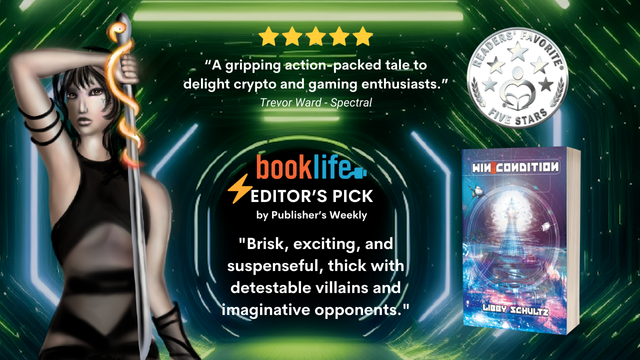Lib’s Library EDITION 003: WorldCon Extravaganza and ArtBook Giveaway!
Oh my! I meant to write so much sooner. I blinked, and somehow the world sped by. Books have been sold, the mailing list has grown from a handful of early supporters to over two thousand subscribers! Illustrations have been illustrated and baby shibas were born. 40+ flights later, I’ve finally found a quiet night to squeeze in an update.
Achievement Unlocked - Seattle WorldCon 2025
I have long dreamed of attending WorldCon, one of the largest science fiction conventions in the world, which also hosts the Hugo Awards. I never imagined that my debut would be as an author, let alone include three events plus signed copies of my book getting placed in Bardwood Book Nook in the Dealers' Room.
In addition to a book reading and table talk, I’m presenting my research project, Crypto’s Utopian Paradox, on how financial incentives conflict with utopian ideals and impact behavior in tokenized ecosystems. There will also be a formal academic paper released later this year.
Schedule
Academic Track: Room 320, Thu. 12:30–1 p.m
Win Condition Reading: Room 429, Fri. 10:30–11 a.m
Table Talks: Room 427, Sat. 10:30–11:30 a.m.
Crypto Worldbuilding SFWA Publication
The Science Fiction and Fantasy Writers Association (SFWA) receives over half a million hits per month, and they were kind enough to feature me in their blog where I write about how to worldbuild with digital assets (aka. crypto).
Artbook Update
A special thanks to all of you who signed up during the ETH Denver event. It’s been longer than I had hoped due to a series of unexpected life events and family emergencies, but I’ve had a moment to breathe, and illustrations for the collectible hardcover edition have been happening bit by bit, without AI, so it’s not quite ready for launch, but I’ve made it far enough that I’ve started exploring print options.
Five fluffy reasons that the art got delayed
Community Gift
I always wanted to gift my book to the community that inspired its creation, and now I’m making good on that promise. If you haven’t picked up a copy of the audiobook yet, you can click here for instructions on how to get it for free. And to be fair to the signups this past spring, I’m doubling the collectible artbooks given away so your chance to win won’t be diluted.
Media Copy & Art Teaser
Every Review Helps ⭐⭐⭐⭐⭐
Thank you all who have already left reviews, they have helped Win Condition reach a wider audience, and are a big part of why I was able to secure favorable slots at WorldCon. Even if you haven’t quite finished it, a review goes a long way on GoodReads, SoundBooth, and Amazon. It only takes a few minutes, and I cannot thank each and every one of you enough who have helped make this a success.








